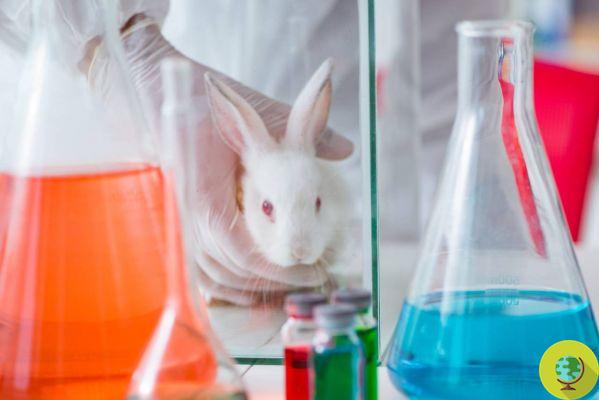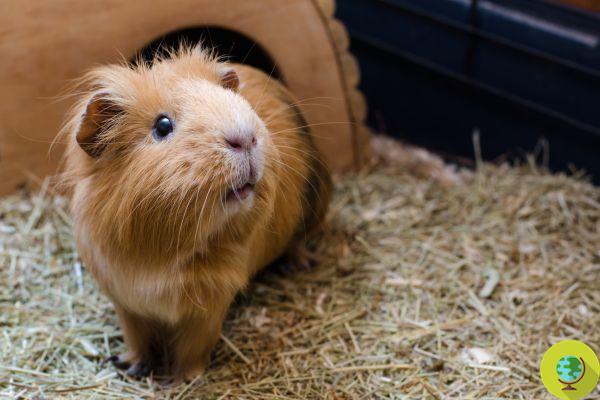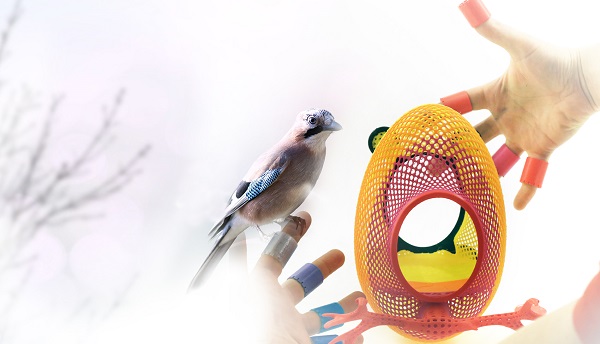
Pesticides are also tested on animals and thousands of rats, rabbits, dogs, etc. die from these experiments every year. throughout Europe
He is about to end up run over, his mother saves himWe know that many ingredients present in the formulations of our cosmetics or medicines have first been tested on animals to verify their efficacy and safety. But what you may have never thought about is that this problem also concerns pesticides which, in the same way, are tested on mice, dogs, rabbits or guinea pigs before reaching the market.
To draw attention to this further dark side of pesticides is the Swiss magazine K-Tipp which, data in hand, reminds us that animals are once again the first to pay for these poisons, thousands of animals in all Europe and in the world. Each new pesticide, in fact, must be approved before it can reach the market and this requires tests that are conducted on dogs, rabbits, guinea pigs or other "laboratory" animals.
The producers present the results of the laboratory tests conducted on animals to the state authorities who, based on the results obtained, decide whether or not these products can be used and also the maximum quantities allowed.
Dogs or other animals used by guinea pigs are then given these poisons through food, water, capsules or even tubes for a period of 90 days. The animals at the start of the experiment must be "healthy and four to six months old". This is stated by the official test guidelines of the Organization for Economic Cooperation and Development (OECD).
Once a week for each animal, abnormalities such as "gait and posture disturbances, convulsive contractions or abnormal behaviors such as walking backwards or self-mutilation" are documented and obviously also signs of possible poisoning.
Approval of a single pesticide requires as many as 30 standardized tests with approximately 10.000 animals. Of course, most of these animals die as a result of the tests. A real massacre that could be avoided by simply changing the system and no longer using these cruel experiments.
According to Thomas Hartung, Professor of Toxicology at Johns Hopkins University in Baltimore (USA), many of these animal experiments are obsolete and no longer guarantee safety for human health. And it is also Professor Hartung who makes it known that the animals used in the experiments are "changed after treatment": "the animals are therefore usually killed".
The example of the Swiss situation is given. According to the Federal Food Safety Office, between 2000 and 2019 over 83 animals were tested with "agrochemicals", including pesticides. In the workshops there were mice, rats, rabbits, guinea pigs, birds, fish and dogs. Approximately 76.400 animals suffered "minor to severe pain or damage". In one in four animals, the poisons caused a "serious impairment of general conditions". Thousands of animals had "severe long-term fear".
The data from the Swiss Federal Office also speak of other tests conducted on 128.500 animals with "chemicals potentially harmful to the environment", including pesticides, over the same period. One in seven animals suffered from "moderate to severe pain" over a long period of time.
It is after these tests and after making thousands of animals suffer that pesticides are given safety warnings such as: "Causes severe skin irritation and eye damage", "Can be fatal if ingested or can enter the airways", etc.
K-Tipp has also contacted some of the large pesticide producers in the world for more detailed information on the experiments they perform on animals. Basel-based chemical giant Syngentaha said it was subcontracting this work. However, he made it known that the tests would take place "anywhere in the world".
As for Bayer, the German chemical company needed 95.010 laboratory animals last year, including 855 dogs, cats and monkeys. However, Bayer did not disclose how many of them were used specifically for pesticide tests.
Corteva agrochemical company (USA) does not provide data. But all laboratory animals would be "treated in an ethical, humane and compassionate way" (!). The German chemical giant BASF carries out experiments on animals "mainly" in Ludwigshafen (D) and in its laboratories there are rats, rabbits, mice, fish and "rarely dogs".
Don't you think all of this is unacceptable in 2021? We've been talking about alternatives for years, where are they? And then all this suffering for what? Develop new pesticides that poison the world and humans!
Fonte: K-Tipp
Read also:
- Zac Efron will make you cry with 'Save Ralph', the short film against cosmetic tests on animals
- Terrible abuse and gratuitous cruelty in an animal testing center in Spain
- India: stop to shark finning and towards a ban on animal testing for household products













